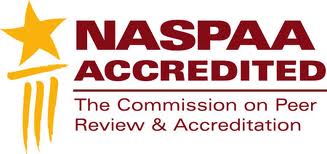MPA - Program Transparency

The mission of the MPA program is to develop both the general knowledge and specific abilities needed for leadership in governance and community-based organizations. The curriculum is designed to prepare graduate students for careers in state, local, and regional governance; policy, advocacy, and evaluation; nonprofit management; criminal justice; and health administration. We are committed to developing in graduate students the capacities for ethical judgment, critical thinking, and the core competencies necessary to fulfill multiple roles as effective managers and public servants. Learn more about the courses, concentrations, and requirements.
The MPA program is accredited by the Network of Schools of Public Policy, Affairs, and Administration (NASPAA) since 1995. This accreditation certifies that our MPA degree maintains rigor and relevancy for the 21st Century public servant. All students, by graduation, should achieve the NASPAA competencies and be able to effectively:
- lead and manage in the public interest;
- participate in, and contribute to, the public policy process;
- analyze, synthesize, think critically, solve problems, and make evidence-informed decisions in a complex and dynamic environment;
- articulate, apply, and advance a public service perspective; and
- communicate and interact productively and in culturally responsive ways with a diverse and changing workforce and society at large.
Fall 2024 Profile
Once you begin your MPA studies at GVSU, you have eight years to complete the program. The timeline for completion varies by student, and can depend on a variety of personal factors such as work and family schedules or financial aid. The Graduate School considers full-time status to be nine credit hours per semester. The time to complete the MPA degree for full-time students is typically five semesters. Part-time status is less nine credits per semester. Part-time students who take six credits per semester complete the MPA degree in seven semesters.
Of all the students who enrolled in their first semester of the MPA program five years ago (2018-2019), 54% completed the MPA degree in 4 or fewer years. For the cohort of students who began in the 2018-19 academic year, 41 students enrolled initially.
- Students who graduated within two years: 12
- Students who graduated within three years: 19
- Students who graduated within four years: 22
- Total students persisting to graduation: 26
At the time of graduation, 94% of MPA graduates find employment in a variety of fields. Sample jobs obtained by graduates include County of Kent, City of Grand Rapids, City of Wyoming, City of Port Huron, Cherry Health, and Family Promise.
Those who graduated in 2023-24 hold positions with:
- State/Provincial/Regional government: 2
- City/county government: 5
- Nonprofit, Domestic: 9
- Private sector, research/consulting: 1
- Obtaining further education: 1
- Unemployed seeking employment: 0
- Unknown: 1
